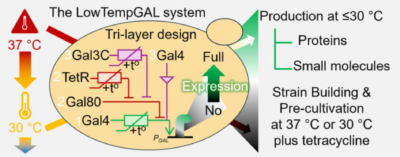Remember the metabolic engineering work in S. cerevisiae of the lab of Claudia Vickers from the University of Queensland? In 2021, they disclosed very elegant strategies, e.g., flux redirecting, metabolic modulation. Selective auxin-mediated degradation of essential proteins indeed allowed them to redirect metabolic flux and modulate metabolism in terpene-producing yeast strains. Labeling with FAST of The Twinkle Factory then allowed them to observe single cell level changes in the induction of the GAL promoter in engineered S. cerevisiae strains.
Three years later, in 2023, Bingyin Peng of QUT reported their investigations around the phenotypic diversity and its genetic origin in S. cerevisiae. Namely, they showed that multiple factors, including plasmid integration status, subchromosomal location, gene copy number, sesquiterpene synthase expression level, and genome rearrangement, together impact sesquiterpene productivity. FAST labeling and fluorescence reporting were key in their work thanks to the quantitative correlation between FAST expression and fluorescence.
In 2024, FAST is once and for all the routine technique. And when Zeyu Lu of UQ et al. developed the LowTempGAL system, they again used FAST to monitor Saccharomyces activity, as reported in Nucleic Acids Res. 2024. Their thermal-gated switch can initiate a strong and rapid induction of the GAL promoter within 2 hours upon temperature shift from 37◦C to 30◦C. The response is 4x faster than the E. coli thermal switch reported earlier (assembled from a two-factor NOT gate and showing a ∼8-h delay in induction upon the temperature shift from 37◦C to 30◦C). A building block in the ever-growing genetic toolbox of Saccharomyces to deploy highly responsive Boolean-type genetic circuits.
The Twinkle Factory supplies commercial fluorogens for FAST and splitFAST.
Stain different, tag FAST!
More reading on FAST in Saccharomyces cerevisiae
Nucleic Acids Res. 2024 – Lu, Z., Shen, Q., Bandari, N. C., Evans, S., McDonnell, L., Liu, L., … & Peng, B. LowTempGAL: a highly responsive low temperature-inducible GAL system in Saccharomyces cerevisiae
ACS Synth. Biol. 2024 – Peng, B., Weintraub, S. J., Lu, Z., Evans, S., Shen, Q., McDonnell, L., … & Vickers, C. E. Integration of Yeast Episomal/Integrative Plasmid Causes Genotypic and Phenotypic Diversity and Improved Sesquiterpene Production in Metabolically Engineered Saccharomyces cerevisiae
Nat. Commun. 2021 – Lu, Z., Peng, B., Ebert, B. E., Dumsday, G., & Vickers, C. E. Auxin-mediated protein depletion for metabolic engineering in terpene-producing yeast

Recent Comments